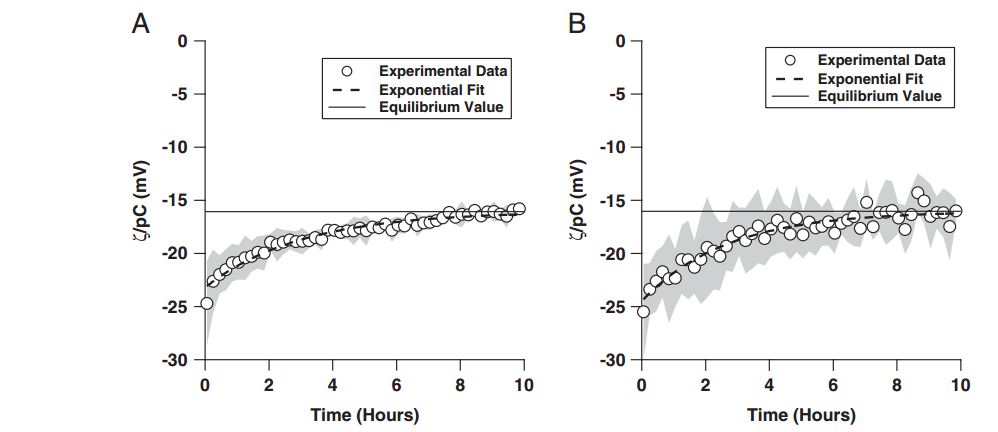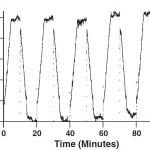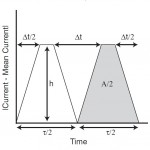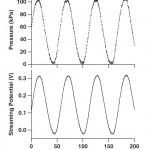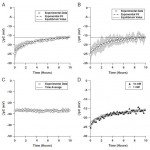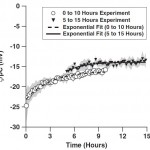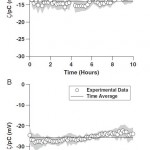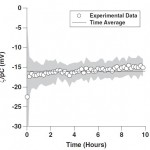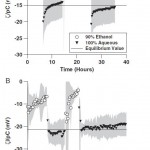Electrophoresis, 2009: Transient zeta-potential measurements in hydrophobic, TOPAS microfluidic substrates
Citation: Tandon V, Bhagavatula SK, Kirby BJ. Transient zeta-potential measurements in
hydrophobic, TOPAS microfluidic substrates, Electrophoresis, 2009(30): pages 2656–2667. doi pdf
Abstract: We utilize time-resolved electrokinetic measurements in order to study the electrokinetic properties of silica and TOPAS microfluidic channels as a function of the time history of the fluid–solid interface. In pressure-driven flow through TOPAS microchannels, the zeta-potential as inferred from streaming potential measurements decays exponentially by a factor of 1.5 with a characteristic decay time of 3 h after the initial formation of the fluid–solid interface. A similar exponential decay is observed immediately after water is exchanged for ethanol as the solvent in the system. In electroosmotically driven flow through TOPAS microchannels, the zeta-potential as inferred through current monitoring experiments was constant in time. No electrokinetic transients were observed in silica microchannels under these flow conditions.
Figures:
- Figure 1. Example of a current monitoring raw data trace. For this data, 10 mM, pH 7, phosphate buffer was used in a silica capillary.
- Figure 2. Schematic showing how current monitoring data were converted into a velocity measure using a trapezoidal profile.
- Figure 3. Example of raw streaming potential data. For this data, 1 mM, pH 7, phosphate buffer was used in a TOPAS capillary.
- Figure 4. Normalized zeta-potential, zeta/rhoC, (rhoC=log C, C is the counterion concentration expressed in molar) inferred from streaming potential measurements in pressuredriven flow, as a function of time for (A) a TOPAS microfluidic channel with 1 mM, pH 7, phosphate buffer solution (four trials), (B) a TOPAS microfluidic channel with 10mM, pH 7, phosphate buffer solution (six trials), and (C) in a silica microfluidic channel with 1 mM, pH 7, phosphate buffer solution (four trials). In (D), the 1mM data from (A) and the 10mM data from (B) are compared. Data shown are an average of the independent trials, where the shaded region represents the standard deviation between the trials.
- Figure 5. Normalized zeta-potential, zeta/rhoC (rhoC=log C, C is the counterion concentration expressed in molar) in a TOPAS microchannel inferred from streaming potential measurements in pressure-driven flow after 5 h of equilibration (the data were taken from 5 to 15 h after the initial filling of the microchannel). The data are compared with the direct measurement (0–10 h, Fig. 4A). A 1 mM, pH 7, phosphate buffer solution was used, and the data shown are an average of four independent trials, where the shaded region represents the standard deviation between the trials.
- Figure 6. Normalized zeta-potential, zeta/rhoC, (rhoC=log C, C is the counterion concentration expressed in molar) in electrokinetically driven flows as inferred via current monitoring in (A) TOPAS and (B) silica microchannels. A 10mM pH 7, phosphate buffer solution was used in both experiments. Data shown are an average of four independent trials, where the shaded region represents the standard deviation between the trials.
- Figure 7. Normalized zeta-potential, zeta/rhoC, (rhoC=log C, C is the counterion concentration expressed in molar) as a function of time in a TOPAS microchannel under a pressure-driven flow, as inferred via streaming potential. Flow was initially driven through the channel electroosmotically for 12min. A pH 7 solution with 1mM phosphate buffer was used. Data shown are an average of four independent trials, where the shaded region represents the standard deviation between the trials.
- Figure 8. Normalized zeta-potential, zeta/rhoC, (rhoC=log C, C is the counterion concentration expressed in molar) as a function of time in (A) a TOPAS microfluidic channel and (B) in a silica microfluidic channel. Data shown are an average of four independent trials, where the shaded region represents the standard deviation between the trials.

